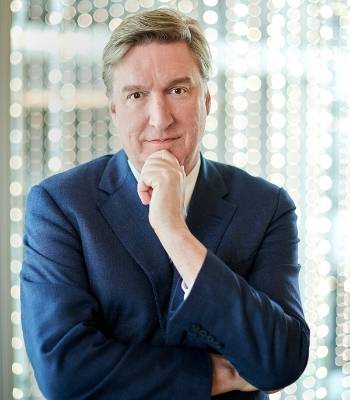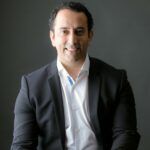Byron Reese

AI Expert, Optimistic Futurist, Tech Entrepreneur, WSJ Best-Selling Author of 5 Books Translated into 13 Languages
Topic Categories:
- Artificial Intelligence (AI), Business, Change, Future of Work, Futurist, Innovation, Inspirational, Leadership, Motivational, Technology, TED
Fee Range: Contact Speaker Exchange Agency
- AI Expert
- Optimistic Futurist
- Tech Entrepreneur
- WSJ Best-Selling Author of 5 Books Translated into 13 Languages
*Fee ranges are presented as a guideline only. Speaker fees are subject to change without notice. For an exact quote, please contact your Speaker Exchange Agency representative.
With over 25 years as a successful tech entrepreneur, Byron Reese is uniquely suited to speak on the transformative effect of technology on the workplace and society at large.
Byron delights audiences worldwide and has been invited to share his reasoned optimism and vivid and energetic presentations on the future with audiences on every continent, including Antarctica.
Known as the “Future of” guy, Byron has spoken on the future of AI, the future of work, the future of banking, the future of education, the future of the planet, the future of agriculture, the future of finance, and the list goes on. When not speaking, he writes books that explore the intersection of technology and humanity and covers topics such as robotics, consciousness, progress, natural resources, and superorganisms.
Bloomberg Businessweek credits Byron with having “quietly pioneered a new breed of media company.” The Financial Times of London reported that he “is typical of the new wave of internet entrepreneurs out to turn the economics of the media industry on its head.” Byron and his work have been featured in hundreds of news outlets, including The New York Times, Washington Post, Entrepreneur Magazine, USA Today, Reader’s Digest, NPR, and the LA Times Magazine. Byron holds numerous patents and has started and sold multiple companies, including two NASDAQ IPOs.
As a lifelong entrepreneur with multiple IPOs and successful exits, Byron frequently speaks to business audiences on how to excel in the world of tomorrow and how to deploy technology successfully.
He states: “Technology multiplies human ability. That’s its trick. It magnifies us. We can move more bricks with a forklift than we can on our backs. Technological advancement is not to be feared; rather, it should be welcomed, for by enhancing human ability, we enhance our productivity and, therefore, our standard of living. This is why we live so much more lavish and prosperous lives than our great-grandparents. An hour of our time is vastly more productive than was an hour of theirs.”
With a gift for storytelling, Byron captivates audiences worldwide with the message that technology is empowering us to build a better world, and he invites his listeners to imagine this better world and build it.
How will automation reshape the workplace? Will robots take all the jobs? Will artificial intelligence displace human intelligence? Are we destined to a future where we work harder and harder for less and less?
Futurist, author, and technologist, Byron Reese dispels the fearful myths around these topics and describes a world where workers of all skill levels use new technology to increase their own productivity.
Byron explains, “Technology will continue to transform the workplace. That is certain. But it will do so by making humans more valuable. The biggest problems of tomorrow will not be a lack of jobs, but a shortage of humans to take advantage of all of the opportunities technology will offer.”
While much of this talk focuses on how technology will reshape the workplace, Byron pays special attention to what workers can do today to maximize their productivity tomorrow. “A few simple rules,” he explains, “will help anyone position themselves to prosper in the world of tomorrow.”
“Workers today should be no more fearful of AI and robots than our great-grandparents should have been fearful of mechanization and electricity. Those devices changed the workplace, but they did so by empowering workers, not replacing them. This is what will happen this time as well.” – Byron Reese
Daily, the media greets readers with a variant of “THE ROBOTS ARE COMING FOR YOUR JOB!” The logic is simple: Everyday robots get smarter, learn faster, and they will never ask for a raise. But Byron believes this simplistic reasoning is entirely wrong. “Just as electricity and the assembly line weren’t bad for workers, in spite of shrill predictions otherwise, AI and robots won’t be either,” he says. “In fact, they will create so many new jobs that our bigger problem will be a labor shortage.”
Sharing insights from his book, “The Fourth Age: Smart Robots, Conscious Computers and the Future of Humanity,” Byron invites us to explore the many advances leading to today’s technological age, and then to consider the vast possibilities of the future, the coming Fourth Age.
What skills will be useful to have in the future? Which technologies should we adopt? How will technology affect the workplace, the home, and society in general?
Answering these questions, Byron suggests that the future is not going to be a frightening place where humans become displaced, but rather “one in which the things that make us human become incredibly valuable. We are entering a world of more choice and more opportunity than ever before,” says Byron, and “the best response is to expand our dreams and expectations, not our fears and concerns.”
Attendees can expect to gain an understanding of:
- AI and robots
- Why AI and robots will create jobs
- How what makes you human makes you valuable
- The coming labor shortage
“When 90% of people farmed, the 10% that didn’t undoubtedly look upon those that did as capable of little else. The idea that those very people could become lab techs, marketing directors, and ice sculptors would have struck them as ludicrous. ‘They are just plain farmers,’ would have been the common retort. But people farmed because we needed farmers, not because that was all they could do. And I believe that a great part of the workforce needs to be liberated from the drudgery of doing the work a machine can do.” – Byron Reese
While audience members once commonly asked, “What should I teach my kids to make sure they have a job in the future?” Byron says today they ask, “What do I need to learn to stay relevant in the future?” And, “How do I keep from falling behind?” Everyone agrees that technology is changing the world. The question is how should we change in response to it? In this talk, Byron tells the story of technology’s advancement from the invention of language until today. He explores what’s to come in the next decade, and examines what we as individuals can do to make the most of changing times.
What skills are useful to have in the future? Which technologies should we adopt? How will technology affect the workplace, the home, and society in general? In this empowering talk, Byron suggests that the future is not going to be a frightening place where humans become displaced, but rather one in which the things that make humans become incredibly valuable.
“We are entering a world of more choice and more opportunity than ever before, and the best response is to expand our dreams and expectations, not our fears and concerns.” – Byron Reese
Our present age is grappling with big questions around technology: What is really possible with artificial intelligence? Should we fear it or welcome it? Will robots take all the jobs, and if they did, would that be a good thing? Can computers achieve consciousness, and if so, do they then acquire rights?
In a talk from his book, “The Fourth Age: Smart Robots, Conscious Computers, and the Future of Humanity,” futurist, author, and technologist, Byron Reese identifies these as fundamentally philosophical, not technical, questions. Instead of telling the audience what he thinks, he teaches them how to apply their own beliefs and values to them to come up with their own answers.
Byron then proceeds to tell the story of technology over the last 100,000 years, focusing on three times in the past when we created a technology so profound that it permanently altered our bodies and minds, changing the trajectory of human history in a dramatic way. Byron believes that humanity is about to be so transformed a fourth time, due to artificial intelligence and robots.
“As humans progressively “outsource” our cognitive activity to computers and our physical activity to machines, once again we will be permanently changed, and in this Fourth Age, humanity will embark on the next stage of its evolution, towards a better world for everyone.” – Byron Reese
This talk overflows with reasoned optimism and is suitable for all audiences, as its focus is not specific technologies, but how to think about technology.
What would you have foreseen seven years ago? There were no self-driving cars or Apple watches. Would you have seen the transformative effect that tablets and smartphones would have?
“The next seven years will have much more change than the prior seven years. We know this. And this is the change we need to begin preparing for.” – Byron Reese
This talk overflows with reasoned optimism and is suitable for all audiences, as its focus is not specific technologies, but how to think about technology.
With a gift for storytelling, Byron captivates audiences around the world with the message that technology is empowering us to build a better world, and he invites his listeners to imagine this better world and build it.
As a lifelong entrepreneur with multiple IPOs and successful exits under his belt, Byron frequently speaks to business audiences on how to excel in the world of tomorrow, and how to deploy technology successfully.
He states: “Technology multiplies human ability. That’s its trick. It magnifies us. We can move more bricks with a forklift than we can on our backs. Technological advancement is not to be feared, rather it should be welcomed, for by enhancing human ability, we enhance our productivity and therefore our standard of living. This is the entire reason why we live so much more lavish and prosperous lives than did our great-grandparents.
An hour of our time is vastly more productive than was an hour of theirs.”
Byron has addressed hundreds of corporations and professional organizations on almost every continent and reports that he is open to traveling to Antarctica to round it all out.
“Robots and artificial intelligence will change the world, empowering humans to be more productive and live better lives. We will use these technologies to end disease, hunger, and poverty. We should no more fear these than our ancestors should have feared steam power and electricity.”
– Byron Reese
The world has, throughout human history, changed. Almost always, this change is for the better. Through civilization, we have raised life expectancy, the standard of living, access to education, and political liberty. How has this change been brought about? Futurist, author, and technologist, Byron Reese explains the change is driven largely by the actions of individuals driven to change the world. This talk focuses on how that change happens and looks at how virtually any individual can literally have a worldwide effect on the history of the planet.
On this topic, Byron demonstrates how current technological changes will ultimately bring about the end of poverty, disease, hunger, ignorance, and war. Additionally, Byron explores how these historical problems of humanity are fundamentally problems of technology, and thus will have technological solutions, solutions we will find much sooner than is commonly believed.
Attendees can expect to learn:
- Why the gloom and doomers always get it wrong
- How technology will transform the world
- What is needed to end misery and want; disease and death
- What to expect from the coming golden age of humanity
“We are entering a world of more choice and more opportunity than ever before, and the best response is to expand our dreams and expectations, not our fears and concerns.” – Byron Reese
No matter your industry, you probably have a sense that you are in one of those radical disruptive periods where everything seems to be changing. You may be wondering when it is all going to settle down so you can take a bit of a breather.
In this talk, futurist, author, and technologist, Byron Reese explores how businesses operating in industries undergoing dramatic changes can prosper and be successful. While traditional futurists seldom bridge the gap between “here is what is going to happen” and “here is how you capitalize on it,” Byron explores how it is that radical technology advancement creates new multi-billion dollar companies, and destroys old ones.
What would you have foreseen seven years ago? There were no self-driving cars or Apple watches. Would you have seen the transformative effect that tablets and smartphones would have? The next seven years will have much more change than the prior seven years. We know this. And this is the change for which we need to prepare.
Attendees can expect to learn:
- How to profit in times of great change
- How to innovate in a rapidly changing world
- How AI will change business
- How to use AI in business … without a data scientist
“Think about AT&T, 3M, NCR and Geico. They are all acronyms. And if you know what they stand for, you will notice something interesting: None of them simply do the thing that is in their name. These companies transformed themselves. And yet, why doesn’t Blockbuster own streaming video? Why doesn’t Kodak dominate in the digital camera world? These cases, and many more like it, are examples of entrenched companies failing to adopt a transformative technology.” – Byron Reese
How should education change? How will it? What skills will ensure that a person can economically contribute in a world of radical technological change?
In this talk, futurist, author, and technologist, Byron Reese answers these questions and explains that the University system is a 12th Century French invention that remains to this day largely unchanged from its origins in the Middle Ages.
“Our K-12 system is a 19th Century German invention designed to produce homogenous factory workers,” he says. “It too remains unchanged since the late 1800s. Now, we find ourselves in a world that has changed in ways no one expected. Now, the two most important job skills are the ability to independently learn new skills and working collaboratively with a team, neither of which are taught in our existing framework.”
Attendees can expect to learn:
- How education will be different in the next decade
- What skills will be needed in a technical future
- How to spot a robot-proof job
- What a 21st Century education could look like
“Our world is full of countless institutions, each of which evolved over that long history to fill a specific purpose. The institutions upon which our world rests will play a big part in how the future unfolds.” – Byron Reese
Want to bring Byron Reese to your next event? Please tell us a little about your event, and we will get back to you shortly!




